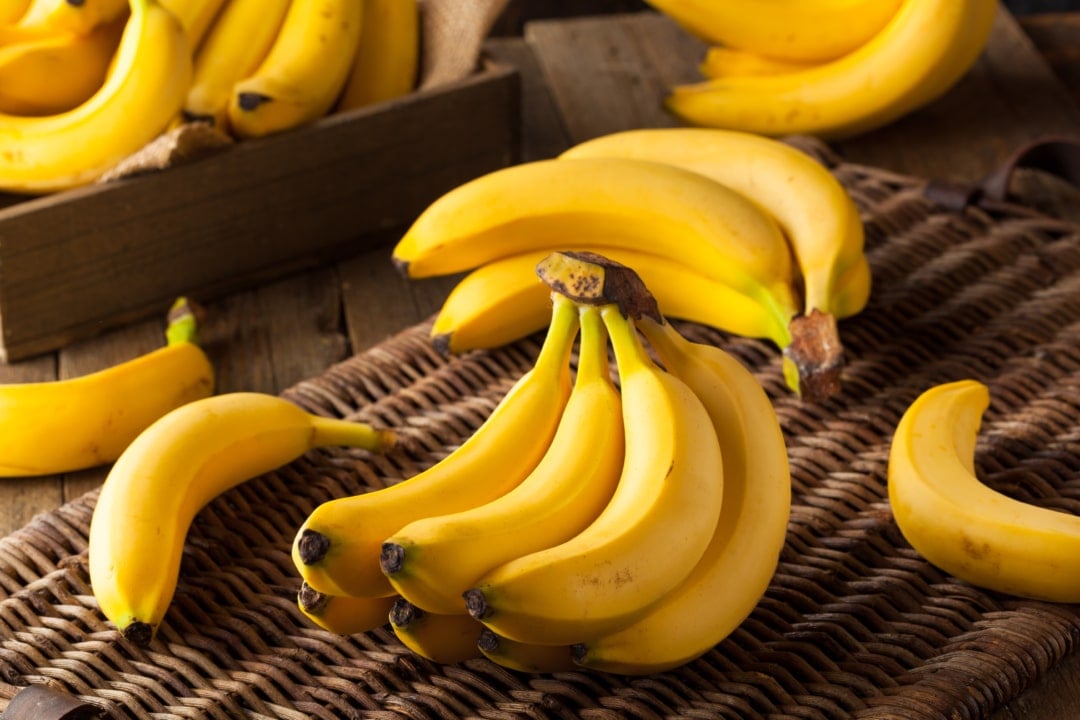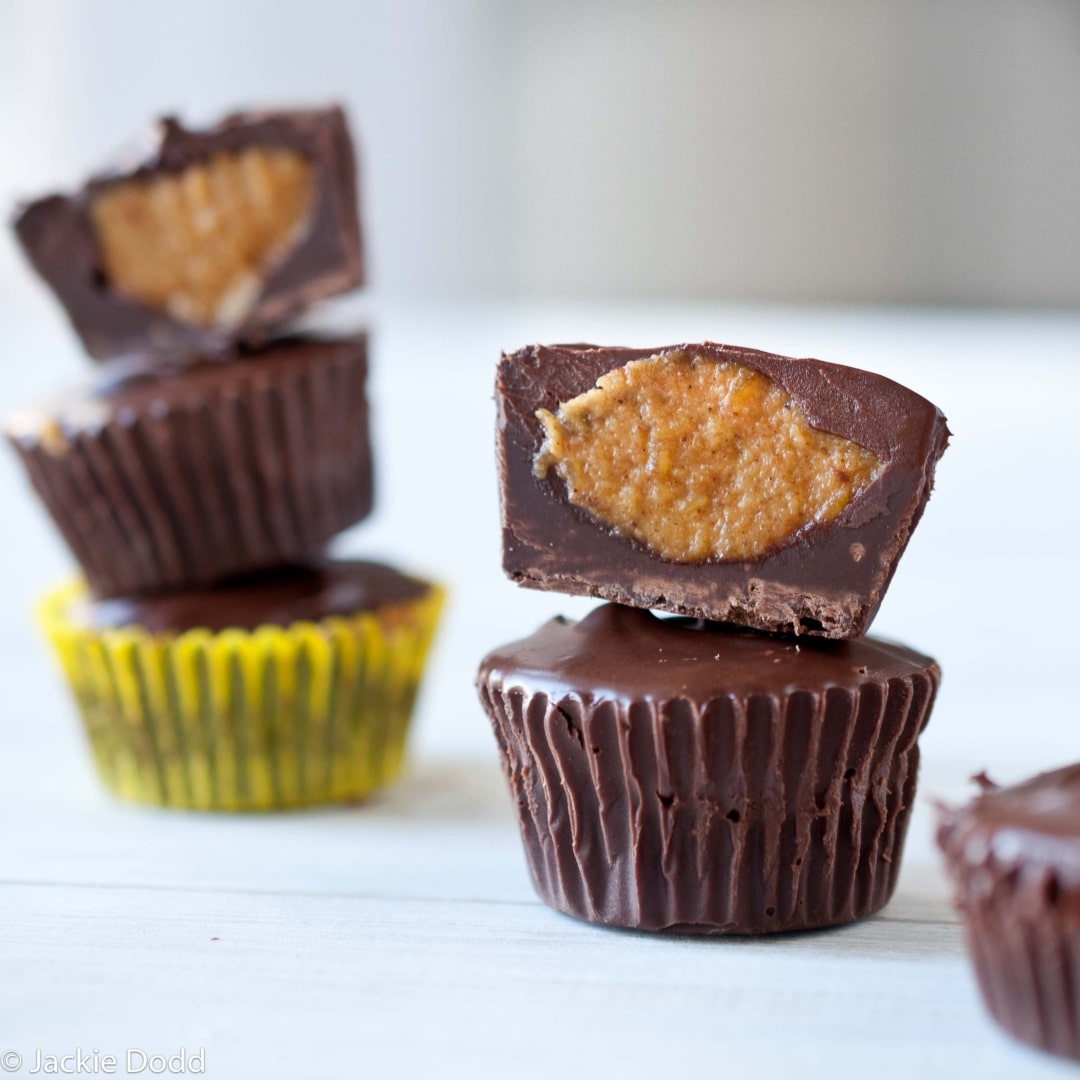10 Health Benefits of Peanut Butter + 6 Tips and Recipes

Peanut butter is a timeless favorite among people of every age group. Apart from being delicious, peanut butter can also provide numerous health benefits. Learn more about the various benefits of peanut butter for your body as well as exciting facts and tips for use.
Delve deep into the world of peanut butter and explore its origins and the fascinating process of its creation. You can also learn if it is compatible with a ketogenic diet and discover nutritional facts and calories.
Additionally, we will discuss some delicious recipes to make using this beloved creamy spread.
Interesting Facts About Peanut Butter
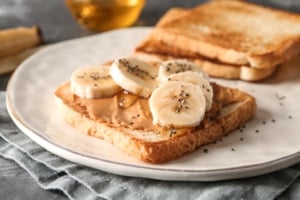
Interesting Facts About Peanut Butter
There are many fascinating facts about peanut butter, a popular spread that appeals to both children and adults. Are you aware that it is not nuts but legumes that peanut butter is made of?
Peanuts belong to the legume family, which makes them more closely related to beans and lentils than tree nuts like almonds and walnuts. Another astonishing fact is that it takes 540 pounds of peanut butter to make a 12-ounce jar.
You will surely be familiar with the world-famous peanut butter and jelly sandwich combinations. The weight of the world’s largest peanut butter and jelly sandwich was 1,342 pounds, testifying to the massive popularity of this combination.
How Peanut Butter is Made
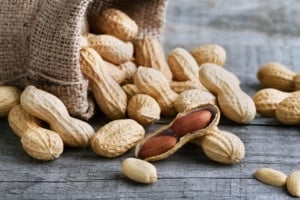
How Peanut Butter is Made
Curious about the creation process of this creamy delight? It is a straightforward journey that begins with selecting high-quality peanuts that are cleaned and roasted to enhance their flavor. Roasting doesn’t only add depth to the flavor but also removes excess moisture from peanuts.
Next, the roasted peanuts are cooled and ground into a thick paste. Depending on the manufacturer, they may add ingredients like salt, sugar, or oils to achieve the desired taste and texture. Lastly, the freshly ground peanut butter is packaged into jars and containers.
Origin of Peanut Butter
Peanut butter originates in South America. Its history can be traced back to pre-Columbian times when the Incas and Aztecs are believed to have ground-roasted peanuts into a paste-like substance.
Nevertheless, peanut butter gained popularity in the United States in the late 19th century. Dr. John Harvey Kellog, a famous nutritionist, and inventor, is usually credited with creating the first modern-day peanut butter in 1895.
He created modern-day peanut butter as a nutritious alternative for people with poor dental health; from there, it rose in popularity.
Is Peanut Butter Keto?
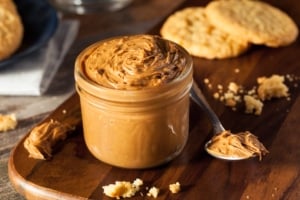
Is Peanut Butter Keto?
With the gradual popularity of the ketogenic (keto) diet, many wonder whether peanut butter consumption aligns with a low-carb, high-fat diet. To put it briefly, the answer is yes.
Natural peanut butter that does not contain added sugars or hydrogenated oils is an excellent addition to the keto diet. Peanuts have a relatively low carbohydrate content.
However, they are suitable for people following a keto lifestyle as they are rich in healthy fats and proteins.
Nevertheless, you must be mindful of your portion sizes considering that peanut butter is calorie-dense and eating in large quantities can hinder your weight loss efforts, even if you follow a strict keto regimen.
Nutritional Facts and Calories of Peanut Butter
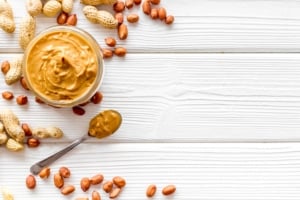
Nutritional Facts and Calories of Peanut Butter
Peanut butter is a delectable treat and a nutrient-dense food, making it a popular choice among health-conscious individuals. A serving of peanut butter is typically approximately 2 tablespoons (32 grams). Regardless of its small portion size, it contains an array of essential nutrients.
In one serving of peanut butter, there are approximately 190 calories, most of which come from monounsaturated and polyunsaturated fats in particular.
Additionally, peanut butter is a rich source of protein, containing 7-8 grams in each serving. Similarly, if you are a vegetarian or vegan and want to increase your protein intake, this spread is an excellent option.
Peanut butter also contains various vitamins and minerals. It is a rich source of vitamin E and essential minerals like magnesium and potassium that help improve the body’s overall health.
Health Benefits of Peanut Butter: That’s How Good It Is For Your Body
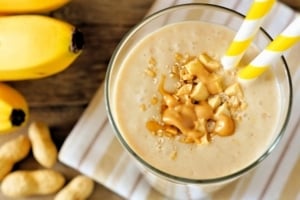
Health Benefits of Peanut Butter: That’s How Good It Is For Your Body
The delightful and creamy spread satisfies your taste buds, satiates your sweet tooth, and offers various health benefits.
Contrary to popular belief, this versatile spread can positively impact various aspects of our well-being, some of which are the following.
Learn here more about the health benefits of olives.
Heart Health Support
One of the most significant health benefits of consuming peanut butter is its positive impact on heart health. As peanut butter is rich in healthy fats like monounsaturated and polyunsaturated fats, it helps reduce low-density lipoprotein (LDL) cholesterol levels, often called “bad cholesterol.”
However, including peanut butter in your diet can also contribute to maintaining a healthy cholesterol level. In addition, the presence of heart-healthy fats supports cardiovascular well-being and reduces the risk of coronary heart disease.
Abundant Protein Source
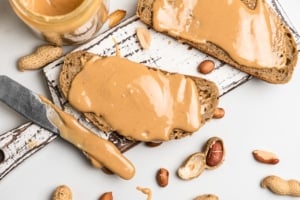
Abundant Protein Source
Peanut butter is a rich source of valuable plant-based proteins, making it an excellent choice for vegetarians and vegans.
A single serving of peanut butter (2 tablespoons) can provide 7-8 grams of protein, making it a convenient and nutritious way to boost your daily protein intake. Protein is an essential macromolecule that builds and repairs tissues, supports muscle health, and maintains a healthy immune system.
Nutrient-rich Profile
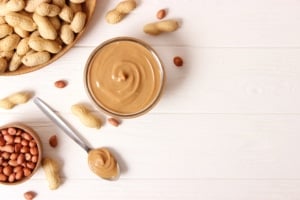
Nutrient-rich Profile
Apart from proteins and heart-healthy fats, peanut butter is a rich source of essential minerals and vitamins that contribute to overall health.
These include vitamin E, an antioxidant that protects tissues and organs from oxidative damage and supports skin health. Furthermore, peanut butter contains magnesium, which is crucial to muscle and nervous function.
In addition, it has potassium, which is known for regulating the body’s blood pressure.
Weight Management
Contrary to popular belief, incorporating peanut butter into your daily diet can help you with weight management.
Although calorie-dense, combining healthy fats and proteins in peanut butter helps promote satiety and curb hunger. As a result, the feeling of fullness ultimately reduces the overall calorie intake.
Not to mention, feeling satisfied and full for a longer period of time helps with portion control and prevents excessive snacking, which makes peanut butter an excellent ally for those individuals looking to manage their weight.
Antioxidant Power
Various antioxidants in peanut butter can help combat free radicals in the body. These include resveratrol, p-coumaric acid, and flavonoids, each of which contributes to protecting cells from oxidative stress and inflammation.
Correspondingly, peanut butter can help support overall cellular health by reducing oxidative damage and the risk of chronic diseases.
Brain Health and Cognitive Function
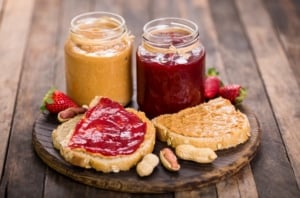
Brain Health and Cognitive Function
Peanut butter has essential nutrients that can help support brain health and improve cognitive function. Among these is vitamin E, which acts as a powerful antioxidant and protects the brain cells from damage due to oxidative stress.
Not to mention, peanut butter is also rich in thiamine (vitamin B1), which plays a crucial role in converting food into energy for the brain.
Furthermore, thiamine is essential for the synthesis of neurotransmitters. These chemicals transmit signals between nerve cells and regulate mood and cognitive processes.
Bone Health
Peanut butter contains calcium and magnesium, essential minerals for maintaining strong and healthy bones. On the one hand, calcium plays a crucial role in bone formation and density.
On the other hand, magnesium contributes to the structural development of bones. These minerals work together to support bone health and reduce the risk of osteoporosis and fractures as we age.
Digestive Health

Digestive Health
Peanut butter is also a good source of dietary fiber, making it beneficial for gut health.
Dietary fiber aids in promoting regular bowel movements. Hence, it prevents constipation.
In addition, a healthy gut flora is essential for overall digestive well-being. Correspondingly, peanut butter contains prebiotics that feed the beneficial probiotic bacteria in the gut, supporting a healthy digestive system.
Energy Booster
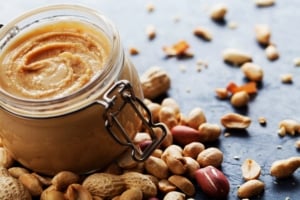
Energy Booster
If you are looking for a quick energy-boosting snack, try peanut butter. The rich combination of healthy fats, proteins, and carbohydrates makes it an excellent energy-boosting snack.
Not to mention, its macronutrients release energy slowly, which helps sustain energy levels throughout the day. Hence, it is ideal for pre-workout fuel or a post-workout treat. Peanut butter also contains B vitamins, which are essential in converting food into energy, supporting overall vitality.
Blood Sugar Regulation
Despite its moderate carbohydrate content, peanut butter has a relatively low glycemic index (GI). Foods with a low GI cause a gradual and steady rise in blood sugar levels, preventing stable energy sources and rapid spikes in blood glucose levels.
This is an incredibly beneficial property for diabetics, as it helps maintain stable blood glucose. Combining peanut butter with other carbohydrate-rich foods like multigrain bread or fruits can further aid in balancing blood sugar levels.
While peanut butter offers many health benefits, individuals with nut allergies should avoid its consumption. Alternatively, you can look for nut and seed butter like almond butter, sunflower seed butter, or soy nut butter.
Peanut Butter in Pregnancy

Peanut Butter in Pregnancy
Unlike what you might expect, peanut butter can be a beneficial addition to a pregnancy diet. It caters to the nutritional needs of the expecting mother and the developing baby.
This creamy or crunchy spread is a convenient source of proteins, healthy fats, vitamins, and minerals. Protein plays a crucial role in the development of babies and supports the formation of tissues and organs.
Healthy fats, such as the monounsaturated fats in peanut butter, are essential for developing a baby’s brain and nervous system. Meanwhile, peanut butter is also a source of folate, the B vitamin that prevents neural tube defects in the early stages of pregnancy.
Nevertheless, it is essential to be mindful of potential allergies and choose natural peanut butter free from additives. Furthermore, it is better to consult your healthcare provider before making dietary changes during pregnancy.
Can Dogs Have Peanut Butter?

Can Dogs Have Peanut Butter?
Yes, you can share your favorite spread with your dog. However, there are some essential considerations that you must keep in mind. Natural, unsalted, unsweetened peanut butter is okay for most dogs to enjoy as an occasional treat.
Peanut butter can be a good source of healthy fats and proteins for dogs.
However, you must ensure that the peanut butter you give your dog does not contain xylitol, a toxic sugar substitute for dogs. Always be cautious, check ingredients, and offer it in moderation to prevent weight gain from the high-calorie peanut butter count.
Tips and Recipes on How to Eat Peanut Butter
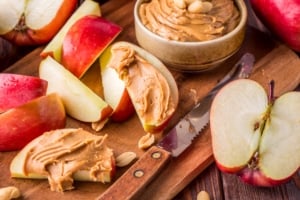
Tips and Recipes on How to Eat Peanut Butter
Peanut butter is not just a spread but also a versatile ingredient that can elevate various dishes.
Irrespective of whether you prefer sweet or savory, here are some mouthwatering recipes and tips to make the most of this beloved spread.
Do you want to learn more about the health benefits of tomato juice? Read on for more information.
Peanut Butter Banana Smoothie

Peanut Butter Banana Smoothie
Start your day on a healthy note with a Peanut Butter Banana Smoothie. In this creamy blend, you can savor the nutty goodness of peanut butter and the natural sweetness of ripe bananas.
To make this delicious smoothie, you must simply blend one ripe banana, two tablespoons of peanut butter, a cup of Greek yogurt, and a splash of milk. If you prefer it sweet, you can drizzle some honey on it.
Also, you may add spinach or kale for an extra boost of nutrients. This is a protein-rich smoothie that is perfect for breakfast.
Healthy Peanut Butter Cookies
Indulge your sweet tooth guilt-free with healthy peanut butter cookies. You can make these chewy cookies with wholesome ingredients to make them nutritious for kids and adults.
To prepare these cookies, combine one cup of natural peanut butter with half a cup of honey or maple syrup, one teaspoon of vanilla extract, and an egg in one bowl.
Then, mix these ingredients until they are well combined. Next, fold in one cup of rolled oats and a handful of dark chocolate chips. Drop spoonfuls of the dough on a baking sheet and flatten them using a fork.
Lastly, bake them at 350°F (175°C) for 10 to 12 minutes until they turn light golden. Enjoy these nutritious goodies with a glass of milk or tea.
Peanut Butter Powder
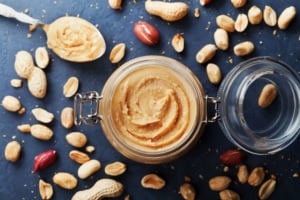
Peanut Butter Powder
You can try peanut butter powder if you want a convenient alternative to traditional peanut butter. This is made by pressing out most of the oils from the roasted peanuts and grinding them into a fine powder.
You can rehydrate the peanut butter powder to create a spread or use it as a flavorful addition to smoothies and baked goods.
For a quick and satisfying peanut butter spread, all you need to do is mix one tablespoon of peanut butter powder with one tablespoon of water until you reach your desired consistency.
For a twist, add peanut butter powder to your protein shake or sprinkle it over your oatmeal for an extra nutty taste.
Sugar-Free Peanut Butter
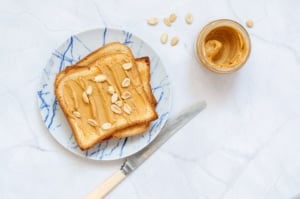
Sugar-Free Peanut Butter
If you are conscious of your sugar intake but want to enjoy the nutty spread, you can easily make your sugar-free peanut butter at home. You only need two cups of roasted, unsalted peanuts and a pinch of salt to prepare this delightful spread.
Add both ingredients to a food processor or blender until they become smooth and creamy. Add a natural sweetener like stevia or monk fruit extract if you prefer a sweeter taste.
You can store your sugar-free peanut butter in an airtight container. Moreover, this homemade spread can be kept in the refrigerator for up to two weeks.
Peanut Butter and Jelly Sandwich With a Twist
Feel free to experiment with the classic peanut butter and jelly sandwich by adding different ingredients to put your unique spin on it. Instead of traditional jelly, you can add sliced fresh berries or mashed bananas as a healthier alternative.
If you want an added crunch, sprinkle some granola or chopped nuts on the peanut butter before adding fruits. Furthermore, adding a drizzle of honey or agave can give it added sweetness.
Peanut Butter Stir-Fry Sauce

Peanut Butter Stir-Fry Sauce
If you want to incorporate our favorite spread into a savory dish, you can make peanut butter stir-fry. Unlike what people usually expect, peanut butter makes an excellent base for savory stir-fry sauce.
To make this delicious sauce, you need to combine two tablespoons of peanut butter with two tablespoons of soy sauce or tamari (gluten-free), one tablespoon of rice vinegar, one clove of garlic, and a pinch of red pepper flakes for heat.
Whisk all ingredients together until smooth and creamy. You can pour sauce over your favorite stir-fried vegetables and proteins, such as tofu, chicken, or shrimp.
Toss everything together until well coated. You can serve this stir-fry with steamed rice or noodles for a satisfying and nutritious meal.
- Tomato Juice. Health Benefits + Tips.
- Asparagus. Benefits for Your Health.
- Mango. Benefits and Side Effects.
- Onions. Health Benefits and Tips for Use.
- Spinach. Benefits and Exctiting Facts.

